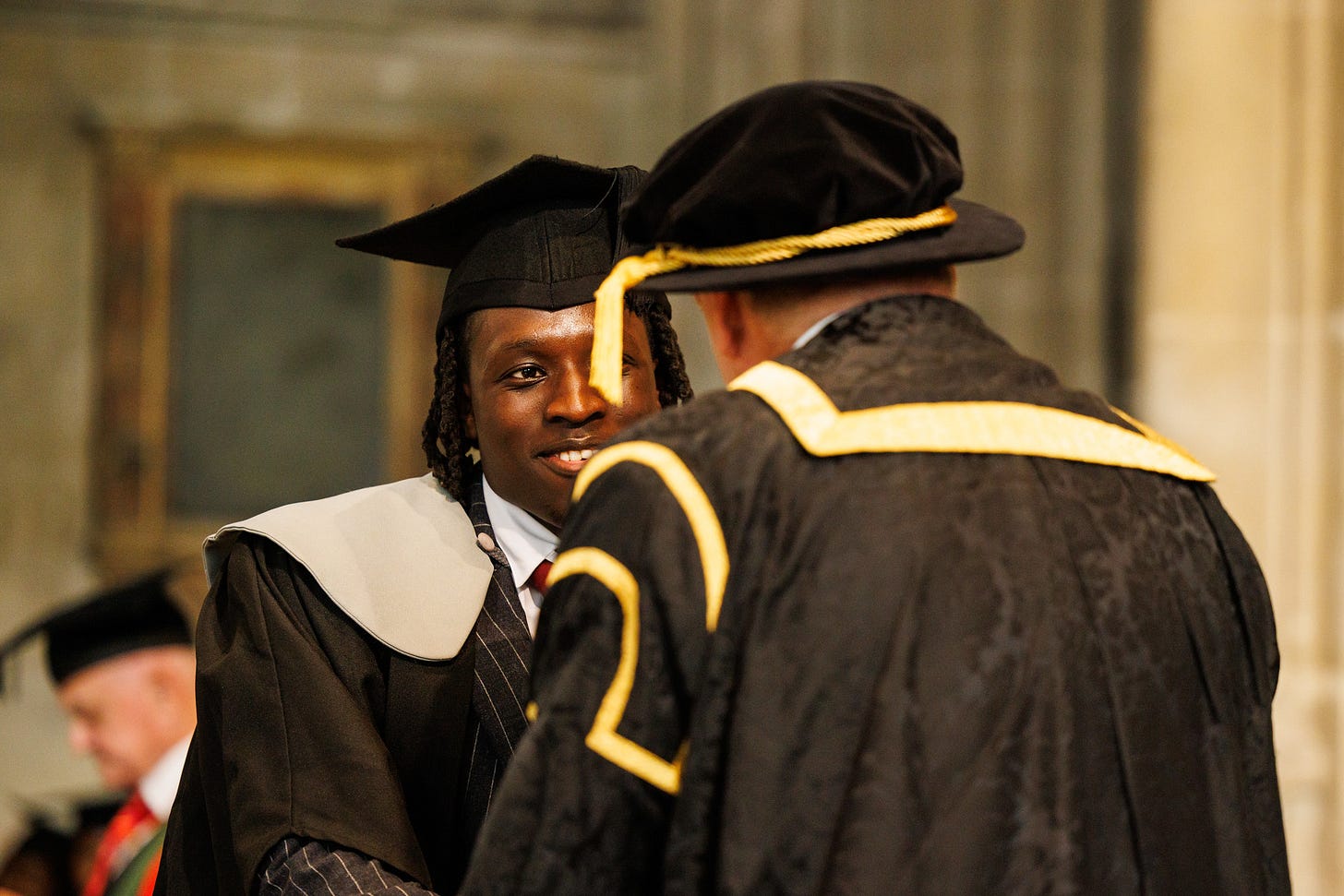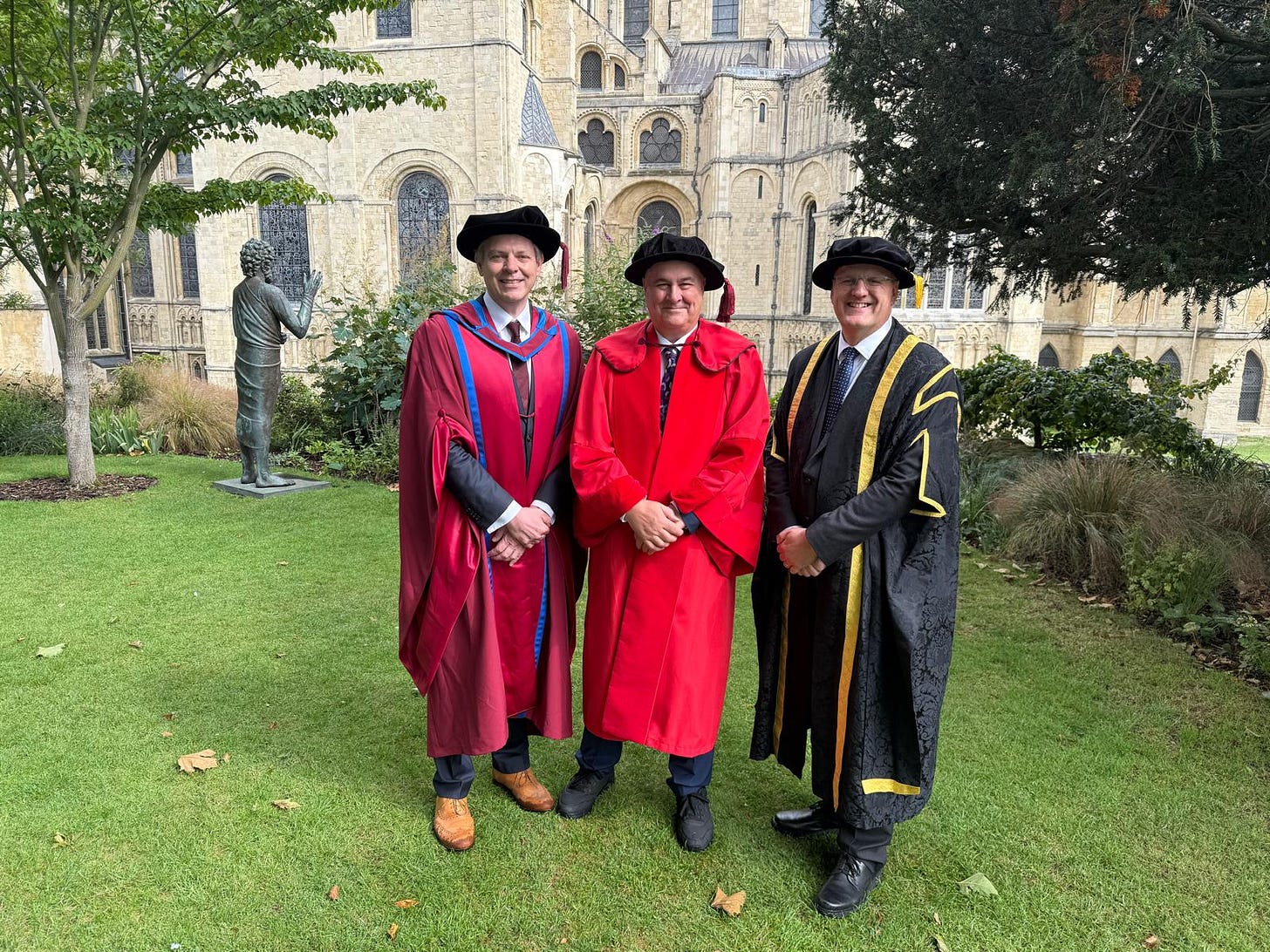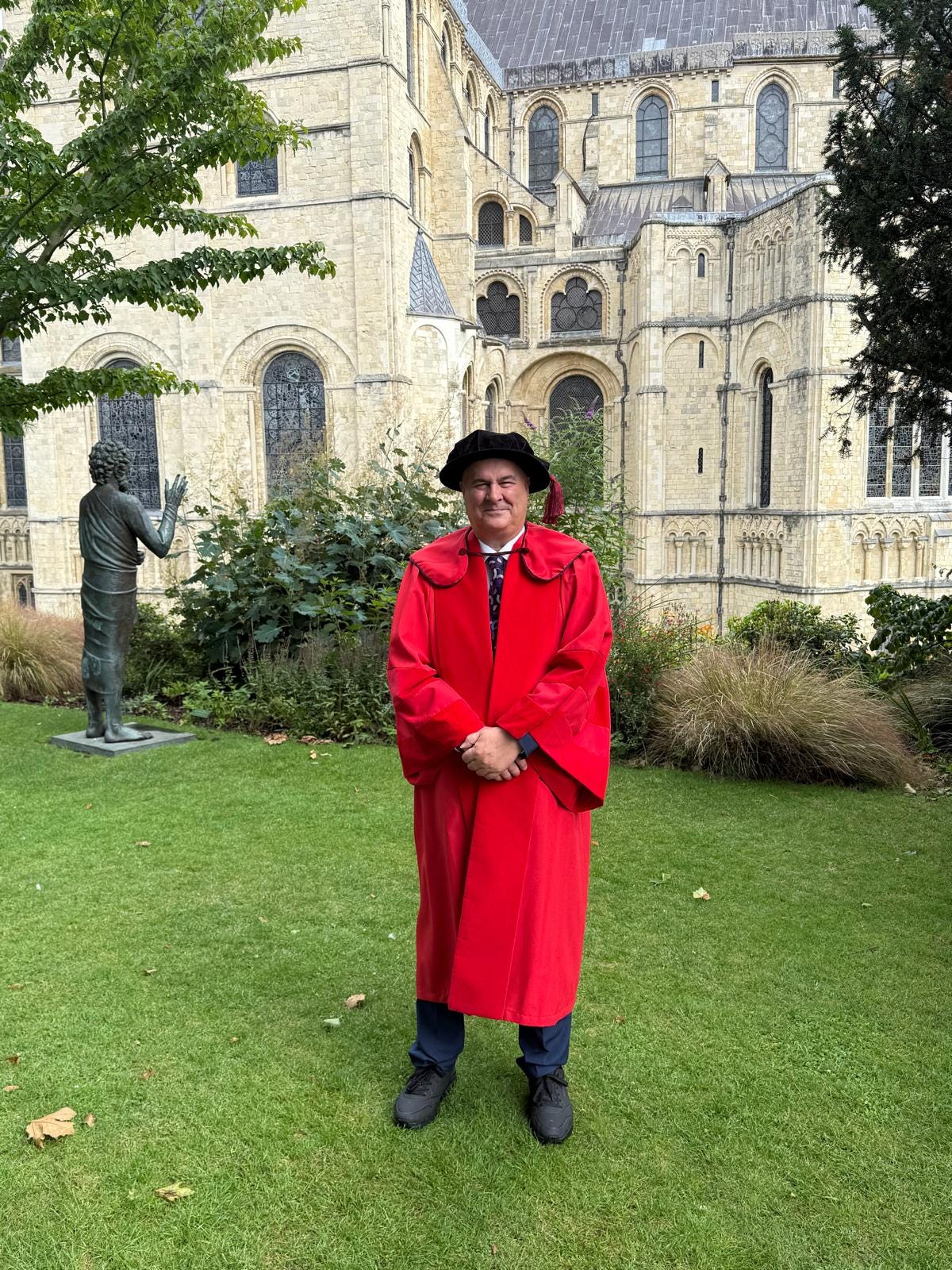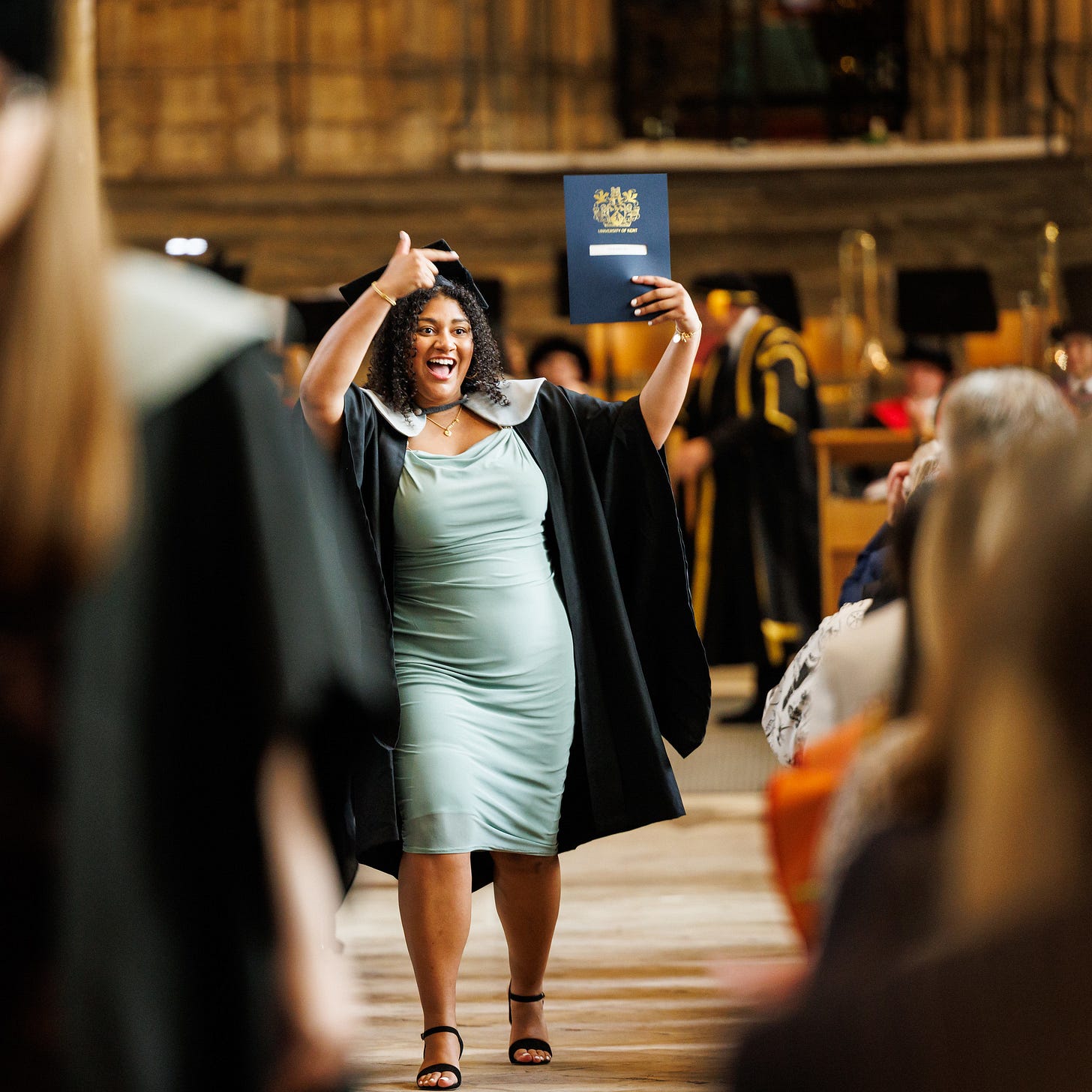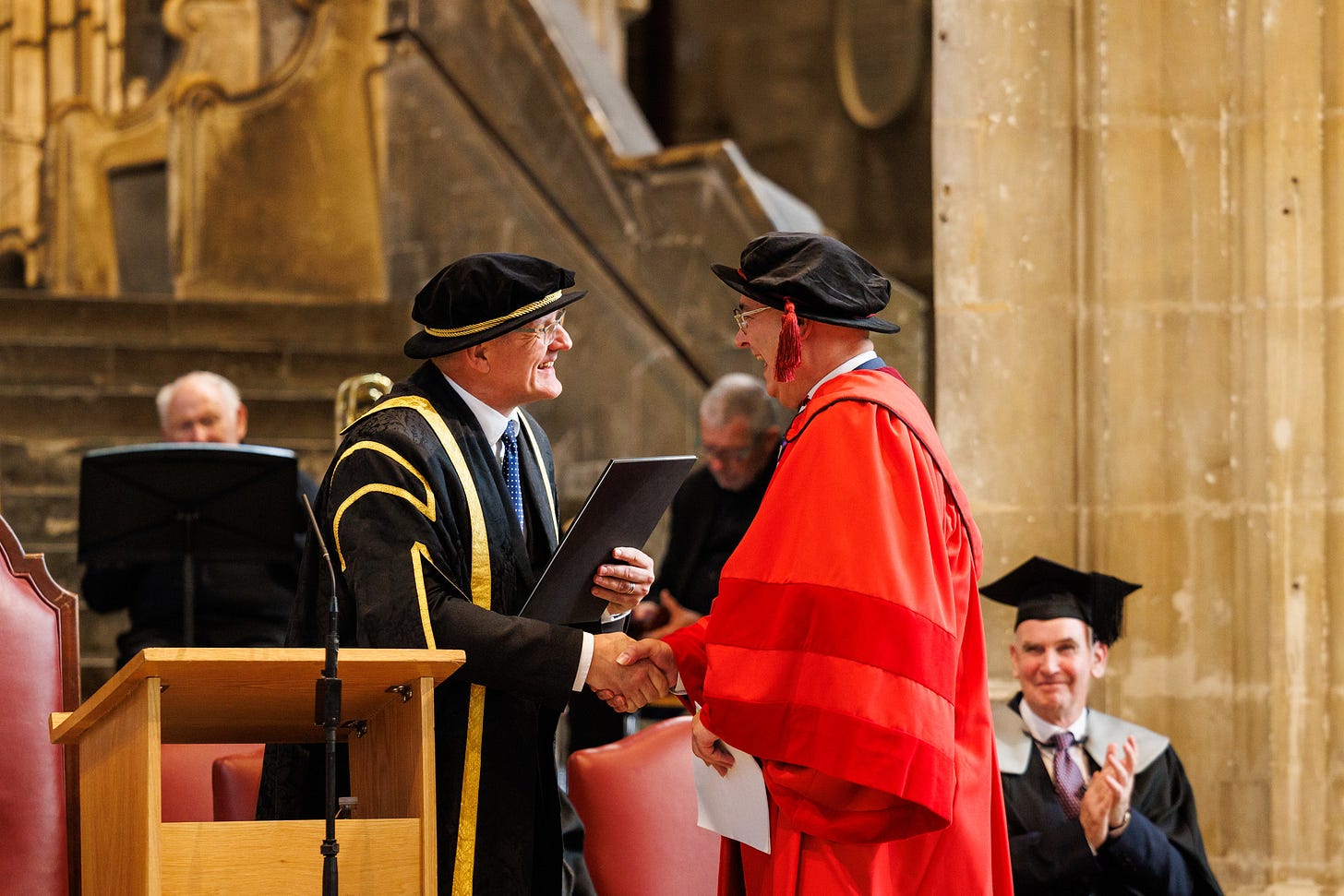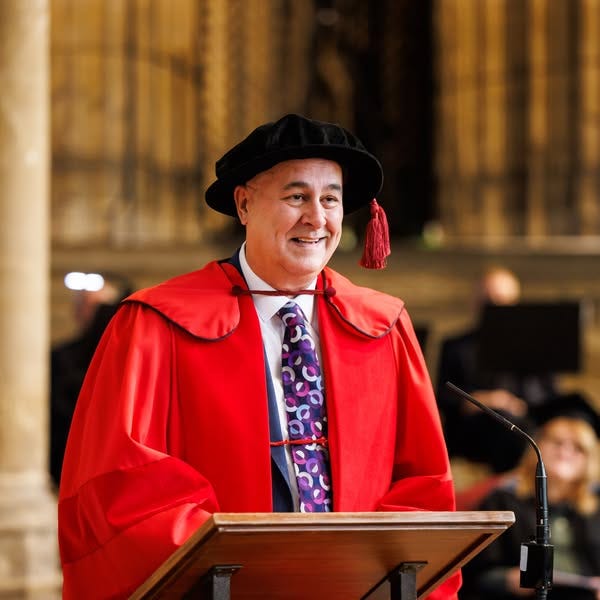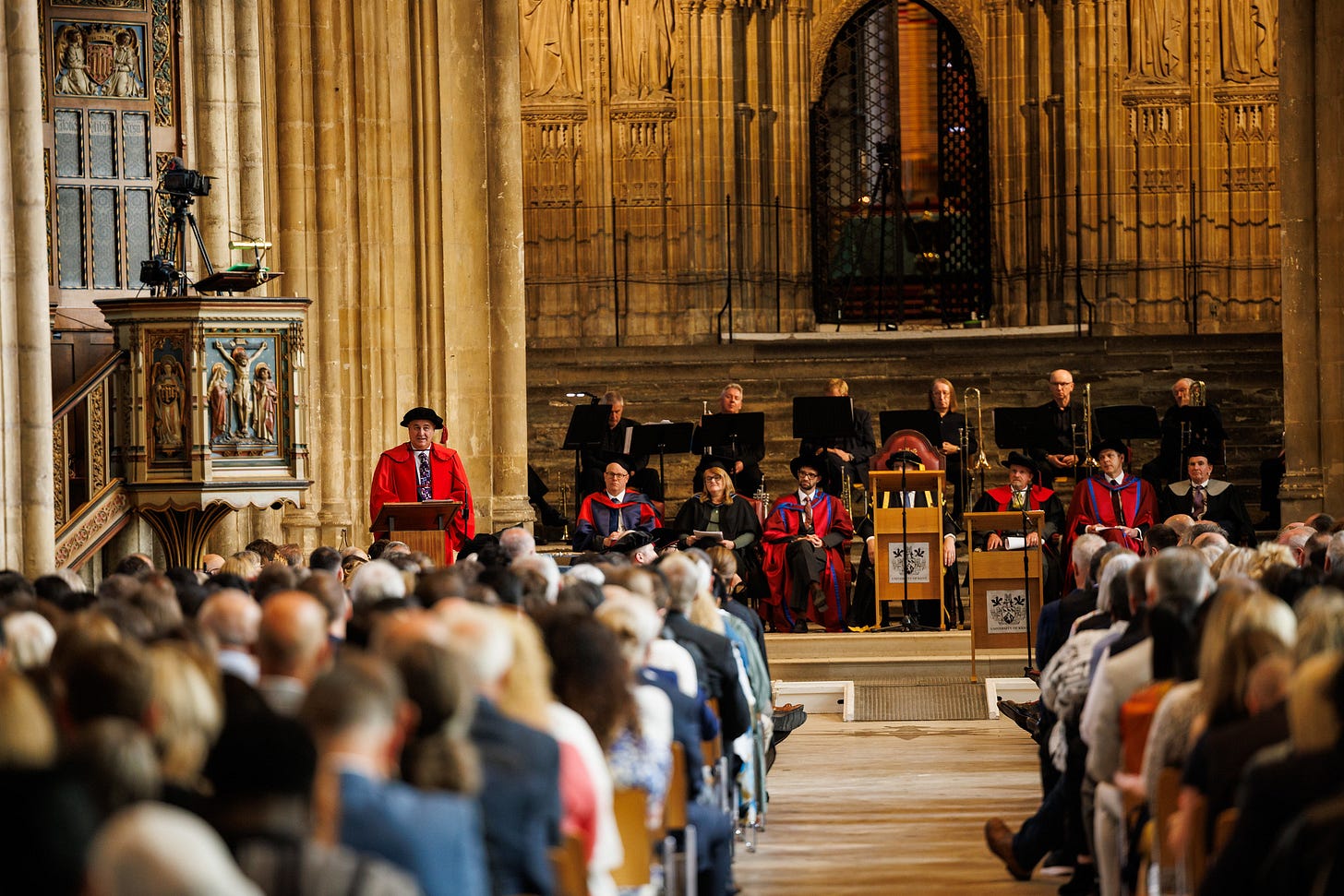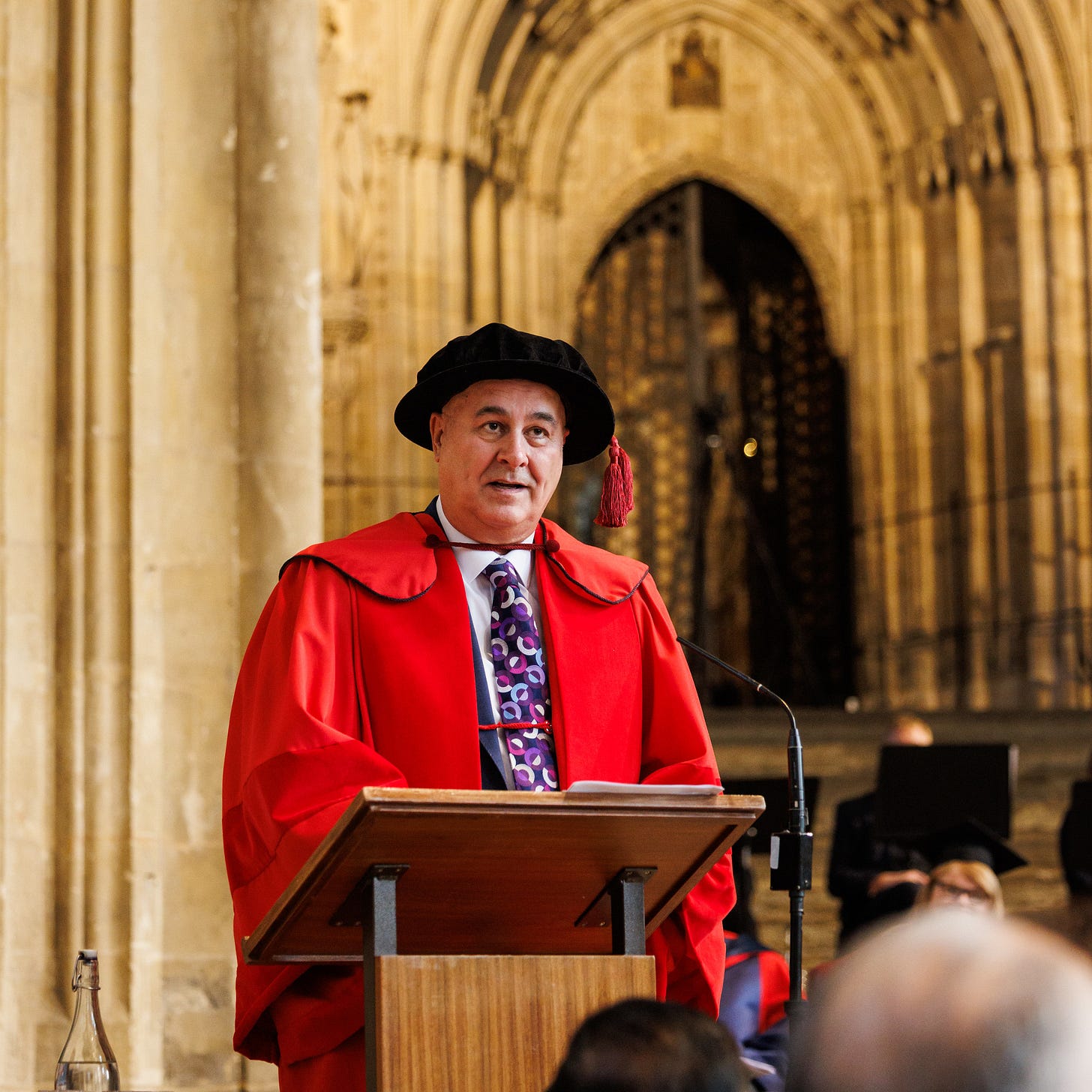[Scroll in 1.09.00 for the Oration and 1.20.00 for my speech]
Three years ago I got an email out of the blue from an academic at the University of Kent asking if I would accept an honorary degree in recognition of my services to political broadcasting and civic discourse. As you can imagine, I was both honoured and delighted. I was supposed to collect in July 2023 but for reasons I won’t bore you with I had to delay until now.
So on Wednesday morning, I spent a delightful couple of hours witnessing more than 700 graduates from the politics and law departments collect their degrees, before listening to an “oration” from Dan Lloyd, a senior academic, talking about me and my career before I got the chance to address the 1000 people seated in the audience in the magnificent surroundings of Canterbury Cathedral. What an experience it proved to be.
My friend Dan drove me to Canterbury Cathedral and we arrived on time at 9am to be greeted by a three person welcoming party, led by the wonderful Dean of Alumni Engagement, Hilary Eldridge. We went into the cathedral so I could get my bearings and stand at the podium where I was to deliver my speech. I felt a real sesnse of awe, yet didn’t feel at all nervous. My only disappointment was not being able to deliver my “sermon” from the pulpit where the Archbishop of Canterbury delivers his (or maybe soon to be ‘her’) sermons from.
I then had my gown fitted, and my hat (!) and felt vaguely ridiculous. We headed out into the garden for photos, where I met old friend Gavin Esler, who is a former Chancellor or the university, and Jonathan Neame, the deputy sherriff of Kent, who was dressed up in some very fine regalia. All it was lacking was a a sword.
At 10.30, we headed to the main entrance to the Cathedral, which by this point was full to the rafters of graduate students and their families, along with academic representatives from the politics and law schools. Around 8 of us processed slowly and solemnly down the aisle behind Hilary, and took our seats in the front row.
After some initial opening pleasantries I spent a very happy 45 minutes or so observing the faces of the each of the graduates as they picked up their degrees from the Deputy Vice Chancellor, Richard Rees. It was a fascinating experience in people-watching. One or two dared to ask Richard for a selfie and he happily obliged.
Half way through, Hilary nudged me to walk up onto the platform so I was on full display when Dan Lloyd deliveted his oration - which was basically a 5 minute speech telling everyone about my career and why I was being honoured in this way. He mentioned my support for West Ham and I then delivered the famous Cross Irons signal by crossing my arms in front of me. I don’t think there were many Hammers in the audience!
And then I was on. I wasn’t at all nervous, but knew I had to enunciate properly so people could make out what I was saying in the cavernous cathedral. I spoke slowly and deliberately. For once, I wasn’t going for laughs. My aim was to make the graduates front and centre of my words and attempt to inspire them. Below is the text of my speech, so you can make your mind up how successful I was. Judging by the length of the applause and the whooping, I think I carried it off. I did get a bit emotional at the end, and as I processed up the aisle out of the Cathedral at the end, two women leaned out from the pews and told me I had made them cry. Job done, I think!
Vice-Chancellor, distinguished faculty, honoured guests, and—most importantly—graduates…
It is a real honour to stand before you today, in this magnificent cathedral, to accept an honorary doctorate.
To receive this recognition for my contributions to politics and civil discourse is deeply humbling—but today, forty years to the week, when I sat where you are all sitting now and I graduated with a degree in German and Linguistics from the University of East Anglia the spotlight rightly belongs to you, the graduates. This is your day.
I was 22 years old, about to embark on my career. I remember thinking I had the world at my feet and being excited at the prospect of what lay ahead. But I also remember that feeling of trepidation at the prospect of venturing beyond the cocoon of university life.
What if I didn’t live up to what people expected of me? What if I was destined to fail?
Well, failure is all part of life, and all failure means is that you’re then provided with another opportunity to succeed.
If you don’t reach for the stars and aim for your ultimate dream, then you’ll never know how successful you could have been.
Aspiration is a wonderful thing, but somehow, too often, we are tempted to settle for second best. To stick with the safe option.
I was a farmer’s son. I was expected to take over the family farm. But I knew from the age of 8 that farming was not for me.
German was the only thing I really excelled at at school, so my intention was to be a German teacher.
But then the political bug bit, and my life took a direction I could never have envisaged - and I’ve never looked back.
Yes, I’ve had failures – who wouldn’t have over a period of 40 years – but instead of wallowing in self-pity – which is the easy option – I’ve picked myself up off the floor and moved on to the next challenge, determined to succeed at that.
It’s called resilience, and it’s a vital part of everyone’s armoury if you are to cope with what life throws at you.
Graduations are not just about celebrating what you have learned, but about embracing the responsibility of what you will do with that learning.
In an age of noise and division, where headlines often shout but conversations too rarely listen, the world needs people who are both courageous and kind.
It needs voices that speak with conviction but also with respect, and minds that can hold firm principles while extending open hands.
Civil discourse—the ability to disagree without falling out, to debate without shouting—is not a luxury of peaceful times.
It is the very foundation of a progressive society.
Every major step forward in our shared history has come not from silencing the other side, but from seeking understanding, finding common ground, and building bridges where putting up walls might have seemed easier.
You, graduates, are stepping into a world that is asking: Who will lead us forward? Not just with policies or profits, but with integrity, with honesty and trustworthiness.
You have studied, argued, wrestled with ideas—now take that same curiosity and courage out into the world. Challenge what is wrong.
Stand up for what is right. Be the voice that calls for calm when all around you is chaos.
In short, do what my generation has often appeared to be really bad at.
I have spent years in the arena of politics and the media, and I can tell you that success is not measured simply by the positions we win or the arguments we make.
It is measured by the lives we touch, the respect we show, and the trust we earn.
And the most powerful tool you will ever have in your career, whatever path you take, is not simply your intelligence or ambition—it is your ability to listen.
In my job, as a radio presenter, it’s not what I say that’s most important, it’s my willingness to listen to other people’s views.
I don’t always succeed. At the weekend I distinguished myself by calling an 88 year old female caller a dinosaur because of the views she was expressing on Afghan immigration.
I may have been factually right, but it didn’t exactly aid a calm, rational debate. But nobody’s perfect.
As you leave this cathedral today, remember that your degree is not just a certificate of past achievement, but a promise of future success and societal participation. The world needs your creativity, and your courage to build a society that does not just shout louder, but speaks wiser and listens avidly.
So, graduates, let me leave you with this: Be brave enough to stand up for what you believe, and humble enough to hear those who see the world differently. In doing so, you will not only change conversations—you will change lives.
And what could be a better life legacy than that?
I must admit, watching you all come up and get your degrees, I found quite an emotional experiences. I’ve never met any of you but watching the expressions of absolute joy on your faces, made me feel proud and inspired, exactly the same feeling that I am sure your parents, family and friends are feeling right now. Bloody well done!
Congratulations to each of you. Thank you for allowing me to share this day with you.
I’d like to thank everyone involved in the organisation of the day. It could not have gone better, and I hope to make repeat visits to the university to speak to students in the future.
UPDATE: This is Dan Lloyd's oration. Makes me blush!
Most honourable Deputy Vice-chancellor, graduates, graduands, colleagues, families and friends
As many of you graduating today will find, successful careers often end up being very different from what you imagined. Sometimes, it’s just because experience tells you more about what you enjoy, or what you’re good at. Other times, it’s more unexpected - when opportunities present themselves, forks in the road appear, and you have to make a choice. And Iain Dale’s career journey, from its beginnings in rural Essex to the multi-award-winning broadcaster we are honouring today, is an example worth remembering.
As the eldest son in an extended family of farmers, he could easily have continued that farming tradition. But he didn’t. Instead, he pursued his love of learning languages, and studied German and Linguistics at the University of East Anglia. Having spent time working in Germany during his studies – including in a school near Stuttgart – he could have followed his original plan to become a German teacher. But he didn’t do that either. Instead, he pursued a deeper passion.
Iain has said that “once he caught the political virus, it never really left him”. And if there is a political virus, it probably took hold at UEA where, as a counterpoint to the left-wing student politics there at the time, Iain set up a Conservative Student Society and supported the Conservative campaign in the Norwich North constituency at the 1983 General Election. Through this, Iain secured his first graduate job with the newly elected MP, Patrick Thompson, as a political researcher in the House of Commons.
A succession of roles followed - in the transport industry, in public affairs, as a columnist and journalist – but politics was never far away. And although in 1997 he moved from London to live in Kent with his partner – now his husband – he remained within Westminster’s orbit when he opened Politico’s, a specialist bookshop which – with its regular events and book launches - became a regular haunt for politicians, high profile media figures and broadcast journalists.
As a result, Iain was regularly invited as a panellist – and then as a stand in presenter - on politics and current affairs programmes on the BBC, CNN, ITV, and Channel 5, building experience of TV and radio broadcasting while simultaneously standing for Parliament in the 2005 general election, acting as Chief of Staff to David Davis MP during his Conservative Party Leadership campaign, writing and editing books, and developing his own publishing business. Eventually, and at another fork in the road in 2010, he moved on from his pursuit of elected office and instead focused on a career in broadcasting. He found his home as a regular presenter with LBC, at various times anchoring the daily Drivetime show, or Sunday Politics, or the Evening Show that he currently presents four days a week.
On each of those evenings, Iain might be juggling interviews, chairing a panel, and taking calls from the public. In these phone-in shows, Iain will often select topics that are underreported, surfacing some of the challenges callers face in their day-to-day lives that aren’t receiving the wider attention they probably deserve. He responds with genuine empathy and emotion to callers’ joy or sadness at the way their lives are shaped by contemporary issues. He builds on the intimacy of radio - open and spontaneous about his own life, his family, his dogs, impostor syndrome, and the ups and downs of being a committed West Ham season ticket holder. And when breaking news unfolds, Iain guides audiences masterfully on real-time developments, whether that is an all-night general election broadcast, or an unexpected tragedy, such as his extraordinary, and award-winning, interview with a distraught eyewitness in the immediate aftermath of the 2013 murder of the soldier Lee Rigby.
Iain has also been a podcast pioneer, harnessing the flexibility, creative opportunities and new audiences that podcast platforms offer. Among them, All Talk creates time and space for long-form interview with high-profile guests. Where Politics Meets History - with the historian Dr. Tessa Dunlop - places contemporary politics within its historical and sometimes unexpected precedents. And For the Many, with the former Home Secretary and now Baroness Jacqui Smith, achieved cult status over its 500 episodes, not just for its uncensored political banter, but for its sense of fun – such as in one episode, moving seamlessly from the serious business of Government to assigning drag names to each of the former Conservative Government cabinet members.
And among the nearly 70 books Iain has written or published, perhaps most pertinent to today – when we celebrate Iain for his services to political broadcasting and championing more civility and courtesy in the conduct of political life - is his book called “Why Can’t We All Just Get Along?” It draws on his own personal reflections and experience in politics and broadcasting to examine the root causes of our current, rather fractious political dialogue, and what we can all do to emerge from division with a greater understanding of other views, and of those who govern us. Iain’s peers admire the way he embodies these values as a broadcaster, with one describing him as “a forensic and mischievous interviewer, but with a deep sense of humanity and kindness” and, perhaps most importantly, “his interviews bring light as well as heat”. And for Iain, that’s the whole point. “If you’re relentlessly aggressive as a broadcaster”, Iain has said, “and a minister closes down to avoid the clip that goes viral on social media, then everybody loses. And the people who lose most, are the audience”. As Iain shows, as an exceptional broadcaster, you can be courteous and civil in political life, and you can still get to the truth.
Most honourable Deputy Vice-Chancellor, to you and to the whole University, I present Iain Dale to be admitted to the degree of Doctor of the University, honoris causa.

